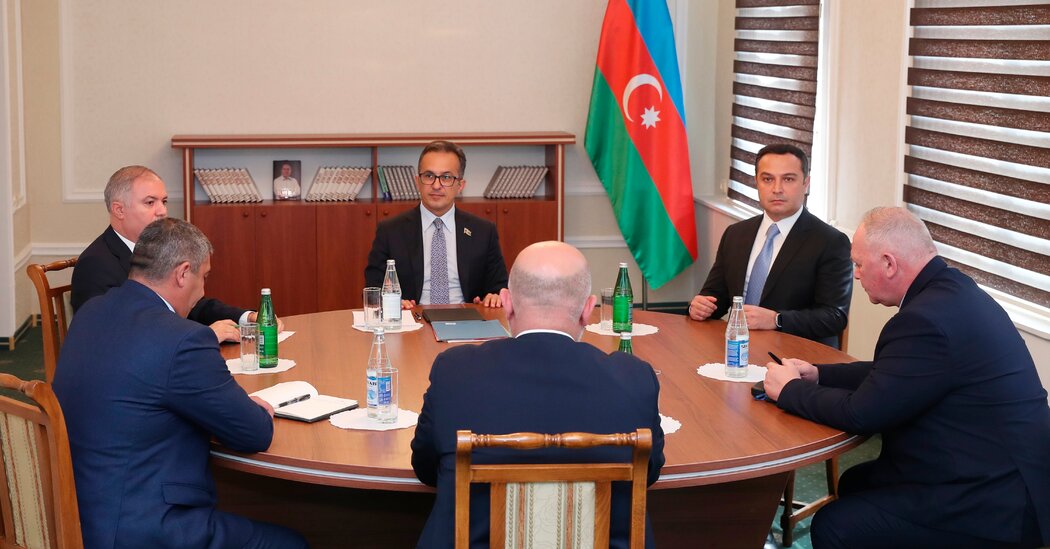One day after Azerbaijan used force to assert its authority over a mountainous breakaway region in the South Caucasus, its officials met with representatives of the pro-Armenian enclave on Thursday to discuss the future of the residents there under new rule.
Escorted by Russian peacekeepers, a delegation of the government from the enclave, Nagorno-Karabakh, met in Azerbaijan with representatives of the Azerbaijani government.
The meeting, which took place in the town of Yevlakh, was described by the Azerbaijani presidential administration as having been held in a “constructive and positive atmosphere,” but did not produce any immediate results.
Azerbaijan’s brisk military recapture of Nagorno-Karabakh — a strategic slice of land slightly bigger than Rhode Island that is internationally considered to be part of Azerbaijan — could further alter power dynamics in the combustible region where the interests of Russia, Turkey and Western states collide.
Azerbaijan’s victory also posed a humanitarian challenge for tens of thousands of Armenians living there. Citing multiple historic grievances, many Armenians have been adamantly opposed to coming under Azerbaijani rule.
And while Azerbaijan’s president, Ilham Aliyev, an address on Wednesday, promised to create “a paradise” for Armenians in Karabakh and claimed they could “finally breathe a sigh of relief,” few in Nagorno-Karabakh were persuaded. They instead heard a message coming from the leader of a nation many Armenians see as bent on destroying them.
“The biggest problem now is what to do with the many displaced people who cannot return to the villages that were captured by Azerbaijan,” said Olesya Vartanyan, an analyst who assesses the region for the International Crisis Group.
Ms. Vartanyan said there were thousands of people in Nagorno-Karabakh who cannot decide what to do: hide in their basements, stay at Russian peacekeeping bases and observation points or try to flee the region. “People are in panic and the humanitarian situation there is horrendous,” she said.
In Armenia on Thursday night, thousands again came to the main square of their capital, Yerevan, to urge their government to take a more assertive stance and protect Armenians in Nagorno-Karabakh. Many have been trying to reach relatives in the enclave, now under full control of Azerbaijan, calling and texting them repeatedly.
“There is no telephone connection, no electricity in most buildings, no food there,” said Marianna A. Vorskanyan, who kept trying her friends in Nagorno-Karabakh. “These people have no idea what is awaiting them. The only corridor they could use to leave is surrounded by Azerbaijan.”
The shift in control also raised serious questions about the apparent waning of Russia’s influence in the region.
Following a 44-day war in 2020, in which Azerbaijan recaptured much of its land, Russia sent about 2,000 peacekeepers to monitor the situation and prevent ethnic clashes. But lacking a clear mandate, the peacekeepers could not prevent a new stage of fighting that flared over the summer and culminated in this week’s Azerbaijani victory.
The authorities in the breakaway government reported on Thursday that at least 200 people had died in the fighting, including 10 civilians; the rest were army servicemen. Those figures could be independently verified.
The Russian Defense Ministry reported that several of its peacekeepers were killed on Wednesday when their car came under small-arms fire as they returned from an observation point in Nagorno-Karabakh.
Prime Minister Nikol Pashinyan of Armenia has been trying to distance his government from the conflict, and to many of the protesters in the capital on Wednesday, his approach was tantamount to betrayal.
“Arstakh!” they chanted — the Armenian name for Nagorno-Karabakh — as they called for Mr. Pashinyan to be arrested.
Some protesters blocked streets leading to the square and a group of them attacked the main government building. But in interviews, people seemed resigned to the idea that Nagorno-Karabakh might be lost, even if not forever.
A smaller crowd in front of the Russian Embassy in Yerevan demanded that Moscow take a more assertive stance. The string of defeats has forced many in Armenia to reconsider the traditional view that Moscow was the country’s main protector.
“We cannot simply rely on others to defend us,” said Rebecca, a 65-year-old protester, who declined to give her last name for fear of repercussions. Standing in front of the government building, she said that she “cannot accept” that Nagorno-Karabakh would be lost forever.
“A miracle must happen,” she said.


